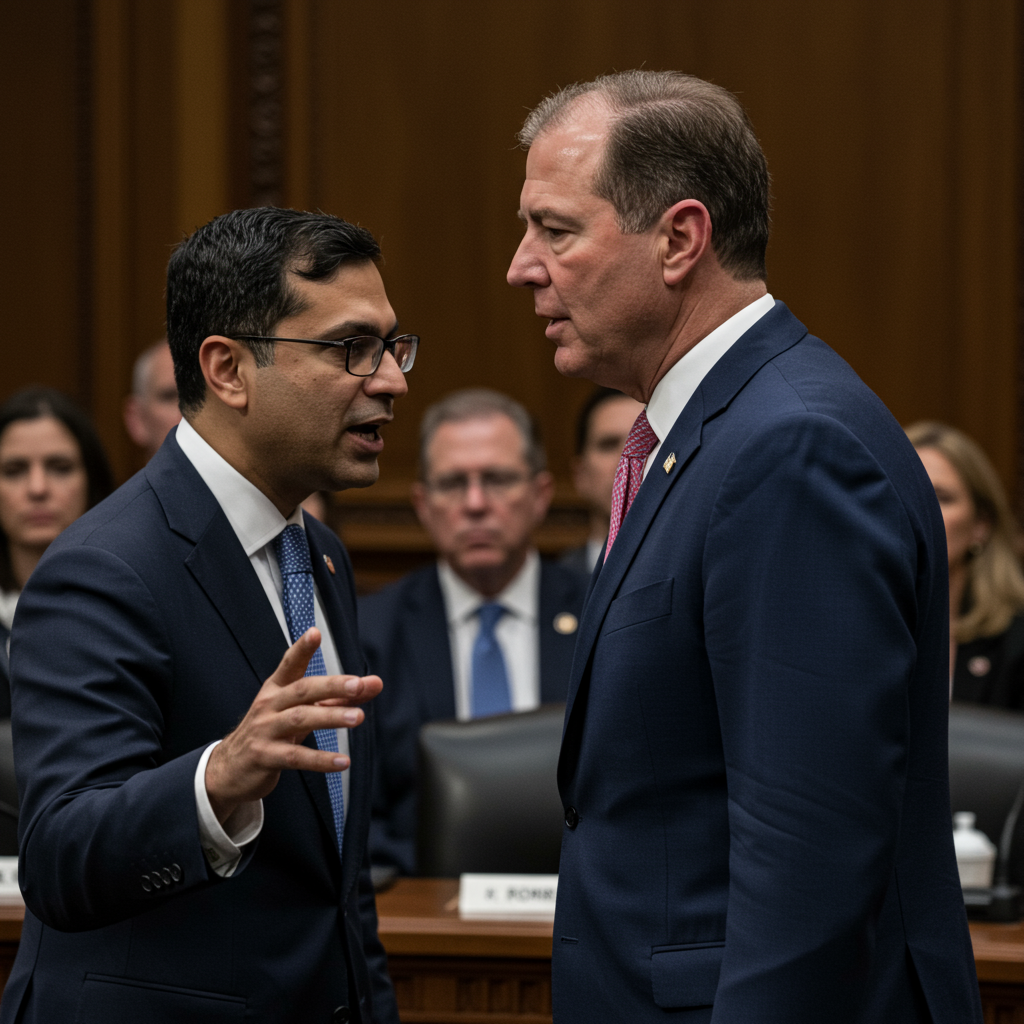On September 14, 2025, House Speaker Mike Johnson appeared on “Face the Nation with Margaret Brennan,” offering a poignant reflection on a nation grappling with tragedy. Interviewed by Major Garrett, Speaker Johnson addressed the profound impact of Charlie Kirk’s recent assassination. His remarks extended beyond grief, touching on the state of American political discourse, urgent legislative priorities, and a hopeful vision for unity. The broadcast explored whether this pivotal event could truly usher in a “turning point” for the country’s deeply fractured political landscape.
A Nation Reflects: The Wake of Charlie Kirk’s Assassination
The week preceding the interview had cast a heavy shadow across Capitol Hill and the entire nation. Speaker Mike Johnson described it as “difficult for the country,” marked by widespread “anger, sadness, and fear.” He shared his personal grief over the loss of his friend, Charlie Kirk, emphasizing Kirk’s enduring message: to move forward boldly and with love, never succumbing to despair. This sentiment, Johnson noted, resonated deeply across political aisles.
Kirk was a vocal proponent of vigorous debate and the free exchange of ideas. Yet, he always conducted these discussions with a fundamental respect for his opponents, never allowing disagreement to breed hatred. Johnson championed this model of engagement, urging all Americans to adopt a similar approach to public discourse. This call for civility arrived at a critical juncture, as the nation grappled with the specifics of Kirk’s death, including the ongoing criminal investigation into suspect Tyler Robinson. The profound shock of the event underscored the urgent need for leaders to foster calm and truth in a volatile environment.
Bipartisan Remembrance and a Call for “Better Angels”
Amidst the national tragedy, a rare moment of bipartisan unity emerged. Johnson highlighted a statement from Connecticut’s Young Democrats and Young Republicans, unequivocally condemning political violence. This cross-party consensus underscored a shared commitment to national healing. Speaker Johnson confirmed numerous upcoming acts of remembrance, including a moment of prayer in the House of Representatives, a vigil at Kirk’s alma mater, LSU in Baton Rouge, and a significant bipartisan prayer event planned for the Kennedy Center. He also pledged to lead a members’ reflection on Monday night.
These efforts, Johnson stressed, were vital for leaders to “speak truth and bring calm.” He evoked Abraham Lincoln’s timeless appeal to the “better angels” of human nature, advocating for a collective return to foundational American values. This focus on shared humanity and respect for differing viewpoints was presented as essential for navigating a deeply divided society. Johnson conveyed a palpable hope that the profound shock of Kirk’s assassination could indeed serve as a catalyst for meaningful change.
Addressing Congressional Fears and the Peril of Inflammatory Rhetoric
The assassination sent ripples of anxiety through Congress. Major Garrett noted a heightened sense of fear among members, many openly discussing security concerns, canceling public events, and even questioning their re-election bids. Speaker Mike Johnson acknowledged these fears, assuring his colleagues of increased resources for both residential and personal security. He stressed that while leadership requires courage, much like the daily dedication of first responders and military personnel, the political environment itself needed urgent reform.
Johnson directly linked inflammatory rhetoric to real-world violence. He cautioned against the increasing use of derogatory labels, such as “Nazis and fascists,” in policy disputes. Such language, he argued, is not only unhelpful but can also incite “deranged people in society” to violent action. He urged leaders across the political spectrum to recognize this dangerous reality and address it responsibly. Johnson expressed optimism, noting that many colleagues from both parties were beginning to echo his calls for de-escalation, fostering hope that this period could indeed become a pivotal “turning point” for the nation’s political discourse.
President Trump’s Influence and the Path to Civil Debate
The conversation shifted to the broader political landscape, particularly the influence of President Trump. Johnson revealed that President Trump knew Charlie Kirk well, considering him “like a family member.” Trump, Johnson noted, admired Kirk’s approach to public debate, which prioritized vigorous discussion without personal animosity. The best way to honor Kirk’s memory, Johnson asserted, was not to shy away from debate, but to refine the tone of those debates.
This return to principled, civil discourse, Johnson believed, aligned with America’s “Judeo-Christian heritage” and core national principles. He emphasized that maintaining a free marketplace of ideas while simultaneously fostering respectful dialogue was crucial for the nation’s health. The discussion underscored the complex challenge of balancing robust political engagement with a renewed commitment to national unity and mutual respect, especially in an era marked by heightened political tensions and rapid, often polarizing, online communication.
Navigating Legislative Hurdles: Government Funding and Russia Sanctions
Beyond the immediate tragedy, House Speaker Mike Johnson also addressed pressing legislative matters. He outlined the House’s ongoing efforts to restore “regular order” to the appropriations process, a long-absent practice on Capitol Hill. Johnson expressed encouragement that the House Appropriations Committee had successfully passed all 12 annual appropriations bills, with three already moving through the House floor.
To prevent a government shutdown, Johnson advocated for a “short-term funding measure,” specifically a “clean CR” (Continuing Resolution). He urged Democrats to support this measure, warning that a failure to do so would lead to a “unilateral decision” on their part to shut down the government. Johnson also voiced strong support for “far overdue” sanctions against Russia, citing a “big appetite” for such action within Congress. He emphasized his personal eagerness to implement these measures and expressed a willingness to collaborate with the White House and Senate. However, he clarified that congressional action required presidential approval, thus deferring to President Trump’s leadership on the world stage, praising him as a “strong and bold leader” capable of brokering peace and ending the war in Ukraine.
The Broader Climate of Political Violence and Economic Realities
Johnson’s remarks resonated within a larger national conversation about political division and its consequences. Reports from the “Face the Nation” broadcast that day highlighted the ongoing investigation into Kirk’s assassination, with authorities sifting through online speculation about motives. Experts like University of Chicago Professor Robert Pape warned of an “era of violent populism,” driven by demographic shifts and exacerbated by online platforms. Pape emphasized that while the internet acts as an “accelerant,” the root causes of political violence run deeper, necessitating strong leadership to model restraint and jointly condemn extremism.
Senators Chris Coons and James Lankford echoed concerns about online extremism and the alarming increase in threats against public officials. They stressed the importance of enhanced security funding and legislative efforts to mitigate online harms, acknowledging the role of social media algorithms in amplifying extreme views. Against this backdrop of political turmoil and safety concerns, CBS News business analyst Jill Schlesinger discussed a challenging economic outlook. She predicted a Federal Reserve rate cut amidst a weakening job market and reaccelerating inflation, further complicating the “burdens of speakership” Johnson referenced. These broader contexts underscored the immense pressure on leaders like Speaker Johnson to navigate both political and practical challenges.
Frequently Asked Questions
What was the primary focus of Speaker Johnson’s “Face the Nation” interview on September 14, 2025?
During his “Face the Nation” interview, House Speaker Mike Johnson primarily focused on the national impact of Charlie Kirk’s assassination. He addressed the pervasive “anger, sadness, and fear” on Capitol Hill and nationwide, calling for national unity and a return to civil discourse. Johnson discussed honoring Kirk’s legacy by engaging in vigorous debate without animosity. He also touched on critical legislative matters like averting a government shutdown with a “clean CR” and imposing “far overdue” sanctions on Russia.
How did Speaker Johnson propose Congress should honor Charlie Kirk’s memory and address the climate of political division?
Speaker Mike Johnson proposed honoring Charlie Kirk’s memory by emulating Kirk’s approach to public debate: advancing truth boldly but always motivated by love, without hating political opponents. To address political division, Johnson emphasized the need for leaders to “speak truth and bring calm,” appealing to the “better angels” of society. He highlighted bipartisan condemnation of the assassination and confirmed planned vigils and moments of reflection on Capitol Hill, hoping these actions would mark a “turning point” for the country.
What legislative actions did Speaker Johnson discuss regarding government funding and international policy?
On government funding, Speaker Mike Johnson detailed the House’s efforts to restore “regular order” in the appropriations process, noting the passage of all 12 annual bills through committee. He advocated for a “short-term funding measure” or “clean CR” to prevent a government shutdown, suggesting Democrats would be responsible if one occurred. Regarding international policy, Johnson expressed strong support for “appropriate sanctions on Russia,” deeming them “far overdue.” He affirmed Congress’s willingness to work with the White House, deferring to President Trump’s leadership to end the war in Ukraine.
A Turning Point for America?
Speaker Mike Johnson‘s “Face the Nation” interview offered a raw glimpse into the challenges facing America on September 14, 2025. His candid remarks underscored a period of deep national introspection following Charlie Kirk’s assassination, highlighting the emotional toll on Capitol Hill and the urgent need for a shift in political rhetoric. Johnson’s calls for unity, civil discourse, and a renewed commitment to respectful debate resonated deeply amidst a broader climate of heightened political violence and economic uncertainty.
As the nation grapples with complex legislative challenges—from averting a government shutdown to addressing international conflicts—Johnson’s leadership will be crucial. His hope that this tragedy could serve as a “turning point” for America, fostering a return to foundational principles of respect and constructive engagement, remains a powerful aspiration. Moving forward, the actions of leaders across the political spectrum will determine whether this moment indeed pivots the country toward healing and a more unified future.


